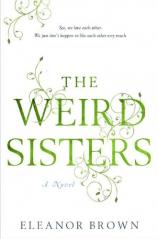The Weird Sisters
Review
The Weird Sisters
The three Andreas sisters have a lot to live up to. There are their names, for one thing. Named after three of Shakespeare's most famous heroines --- Rosalind, Bianca and Cordelia --- they are more than usually sensitive to the significance of their names. The daughters of a noted Shakespeare scholar, the girls have absorbed the Bard's words practically by osmosis since they were too young even to understand their meaning. Besides their names and their literary pedigree, the sisters have tried --- and to a one, failed --- to live up to their parents' model of a loving, joyful, mutually respectful marriage. Heck, these girls can't even keep a boyfriend.
Yes, there have always been high expectations for Rosalind, Bianca and Cordelia (known as Rose, Bean and Cordy) in their small college town of Barnwell, Ohio. But, as the narrator notes in the very first sentence, "We came home because we were failures." Each of the sisters has failed at something, and, in Eleanor Brown's debut novel, each has a chance at a fresh start.
Rose, the oldest, is approaching her mid-30s. She has followed in her father's academic footsteps, obtaining her doctorate in mathematics, but can't find a tenure-track position. The perpetually casual, even borderline dowdy Rose has finally fallen in love. But when her fiancé accepts a fellowship in Oxford, England, she finds herself unwilling to follow. She uses her mother's breast cancer as an excuse to stay behind in Barnwell, but is that just a cover-up for fear?
Bean, the middle daughter and the beauty of the family, has purposefully distanced herself from a life of the mind. Instead, she has spent the last several years in New York City, acquiring handsome boyfriends, exciting social engagements and beautiful clothes, as well as a massive credit card debt. When she is caught embezzling money from her firm in order to pay off her creditors, Bean slinks home to Barnwell in secret disgrace, her car full of designer clothes that she no longer needs or can afford. In classic Bean fashion, she has soon started an affair with a married man. But she --- to her own surprise --- also has found herself more than a little interested in the Episcopalian rector.
Cordelia, the youngest child, has always been a free spirit, following musicians and bands around the country, unsure whether her drifting represents aimlessness or liberation. Unlike her sisters, she never even finished college, preferring instead to follow the road and her own changeable heart. But when she becomes pregnant after a brief fling, she might have found the right reason to settle down at last.
THE WEIRD SISTERS gets its title from the three witches of Shakespeare's Macbeth. But, as the narrative reminds us, for Shakespeare the word "weird" had none of the goofy, odd connotations it holds today. Instead, it was tied up in the idea of fate and destiny, a concept that joins together all three of the sisters' stories. "Rose always first, Bean never first, Cordy always last. And if we don't accept it, don't see, like Shakespeare's Weird Sisters did, that we cannot fight our family and cannot fight our fates, well, whose failing is that but our own? Our destiny is in the way we were born, in the way we were raised, in the sum of the three of us." Birth order, naming --- these seemingly trivial details of a life weigh heavily on the three Andreas sisters as they tell their story.
And they do tell the story, as Brown utilizes an unusual but fitting first-person plural narrator. This narrative "we" means that the sisters are described as individuals and also fused as one collective narrator, in a surprising voice that underscores their often contentious but always undeniable connections. THE WEIRD SISTERS is both a loving portrait of a family of inveterate readers and a complicated inquiry into the nature of fate and the bonds of family.
Reviewed by Norah Piehl on March 28, 2011
The Weird Sisters
- Publication Date: January 20, 2011
- Genres: Fiction
- Hardcover: 336 pages
- Publisher: Amy Einhorn Books/Putnam
- ISBN-10: 0399157220
- ISBN-13: 9780399157226





